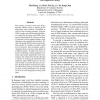110 search results - page 11 / 22 » An Iterative Approach to Word Sense Disambiguation |
112
click to vote
ACL
2004
15 years 3 months ago
2004
Supervised learning methods for WSD yield better performance than unsupervised methods. Yet the availability of clean training data for the former is still a severe challenge. In ...
124
click to vote
EMNLP
2008
15 years 3 months ago
2008
The accuracy of current word sense disambiguation (WSD) systems is affected by the fine-grained sense inventory of WordNet as well as a lack of training examples. Using the WSD ex...
130
click to vote
ICTAI
2009
IEEE
15 years 8 months ago
2009
IEEE
Knowledge plays a central role in intelligent systems. Manual knowledge acquisition is very inefficient and expensive. In this paper, we present (1) an automatic method to acquire...
115
click to vote
CICLING
2010
Springer
15 years 8 months ago
2010
Springer
Recent research works on unsupervised word sense disambiguation report an increase in performance, which reduces their handicap from the respective supervised approaches for the sa...
118
click to vote
NLDB
2010
Springer
14 years 11 months ago
2010
Springer
This paper tackles the problem of term ambiguity, especially for biomedical literature. We propose and evaluate two methods of Word Sense Disambiguation (WSD) for biomedical terms ...

